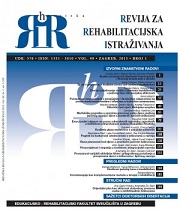Povezanost emocionalnih s ponašajnim i fiziološkim odgovorima na posao medicinskih sestara i tehničara u bolničkim ustanovama
Correlation of Emotional with Behavioral and Physiological Responses to the Nursing and Medical Technician Job in Hospital Facilities
Author(s): Irena HabazinSubject(s): Education
Published by: Sveučilište u Zagrebu, Edukacijsko-rehabilitacijski fakultet
Keywords: emotional well-being; counterproductive behavior; bodily- physical symptoms; socio-demographic characteristics
Summary/Abstract: Aim of this work is acquiring insight into emotional, behavioral and physiological responses to the nursing and medical technician job and defining correlation of emotional with behavioral and physiological reactions to the job and identification of differences in stated answers with regard to socio-demographic characteristics of the respondents. The research was carried out during the year 2009 in secondary and tertiary level hospitals in the Republic of Croatia. The examinee sample included employed nurses and medical technicians (n-752). Applied questionnaire consisted of following instruments: Job-related Affective Well-being Scale - JAWS, Counterproductive Work Behavior Checklist - CWB-C and Physical Symptoms Inventory - PSI. In order to achieve research aims, methods of descriptive statistics, canonical correlation analyses and discriminant analyses were carried out. The most significant results show that majority of nurses and med.tehnicians experience mostly positive emotions at work and manifest a great number of physical symptoms and a little of counterproductive behavior. Besides, it had been determined that experiencing a greater number of negative emotions along with synchronously less positive ones at work is related to the greater number of behavioral and physiological responses and that experiencing positive emotions may be attributed to elderly nurses living with a partner and having more children, while younger nurses living without a partner and without childless characteristically experience more negative emotions. Obtained outcome indicates the need of introducing changes in nursing job ( clinical supervision, supervisional programmes) and programmers of support, which would consider the diversity of nursing population regarding socio-demographic characteristics. However, it should be pointed out that obtained results relate to job in general. Therefore, additional research should be conducted that would include identifying contentment regarding different job properties and some other characteristics of nurses.
Journal: Hrvatska revija za rehabilitacijska istrazivanja
- Issue Year: 49/2013
- Issue No: 1
- Page Range: 37-48
- Page Count: 12
- Language: Croatian

